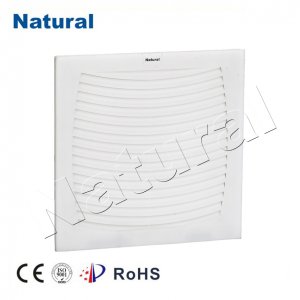Indoor air quality (IAQ) plays a crucial role in maintaining a healthy and comfortable living environment. With the growing concerns over air pollution and allergens, the importance of proper ventilation and air filtration cannot be overstated. One effective solution to improve IAQ is the use of ventilation fan filters. In this article, we will explore the benefits and significance of ventilation fan filters in enhancing indoor air quality.

The Importance of Indoor Air Quality Indoor air quality directly impacts our health, well-being, and productivity. Poor IAQ can lead to a range of health issues, including allergies, respiratory problems, and even more severe conditions over time. Common indoor pollutants include dust, pet dander, pollen, mold spores, and volatile organic compounds (VOCs) emitted by household products. Proper ventilation and air filtration are essential to reducing the concentration of these pollutants and maintaining a clean and healthy indoor environment. The Role of Ventilation Fan Filters Ventilation systems, such as exhaust fans and air conditioning units, are designed to circulate and refresh indoor air. However, without proper filtration, these systems can inadvertently spread pollutants and contaminants throughout the living space. This is where ventilation fan filters come into play. These filters are specifically designed to capture and trap airborne particles, preventing them from recirculating and ensuring that the air entering our homes is cleaner and safer to breathe. Benefits of Ventilation Fan Filters Improved Air Quality:The primary benefit of ventilation fan filters is, of course, the enhancement of indoor air quality. These filters effectively remove a wide range of particles, from large dust particles to tiny allergens, providing cleaner and fresher air. Allergen Reduction:For individuals with allergies or sensitivities, ventilation fan filters can be particularly beneficial. By capturing allergens like pollen, pet dander, and mold spores, these filters help create a more comfortable and symptom-free living environment. Mold and Mildew Prevention:Proper ventilation, along with effective filters, can help prevent the buildup of excess moisture that can lead to mold and mildew growth. This is especially important in areas prone to high humidity. Extended Equipment Life:Ventilation fan filters not only benefit the occupants of a home but also the equipment itself. By preventing the accumulation of dust and debris on fan blades and motors, these filters can extend the lifespan and efficiency of ventilation systems. Choosing the Right Filter Selecting the appropriate ventilation fan filter is crucial to achieving the desired indoor air quality improvements. There are various types of filters available, each with different levels of filtration efficiency. The Minimum Efficiency Reporting Value (MERV) rating system is commonly used to indicate a filter’s ability to capture particles of varying sizes. A higher MERV rating signifies better filtration, but it’s essential to choose a filter that is compatible with your ventilation system to avoid restricting airflow. Maintenance and Replacement Regular maintenance and filter replacement are vital to ensuring the continued effectiveness of ventilation fan filters. Clogged filters can hinder airflow, reducing their efficiency and potentially straining the ventilation system. The frequency of filter replacement depends on factors such as filter type, indoor air quality, and usage patterns. Most filters come with manufacturer recommendations for replacement intervals. In Conclusion Enhancing indoor air quality is a fundamental aspect of creating a healthy and comfortable living space. Ventilation fan filters serve as an indispensable tool in achieving this goal by capturing airborne pollutants and providing cleaner air for occupants. By understanding the benefits of these filters and making informed choices regarding their selection and maintenance, homeowners can take proactive steps toward improving the quality of the air they breathe every day.